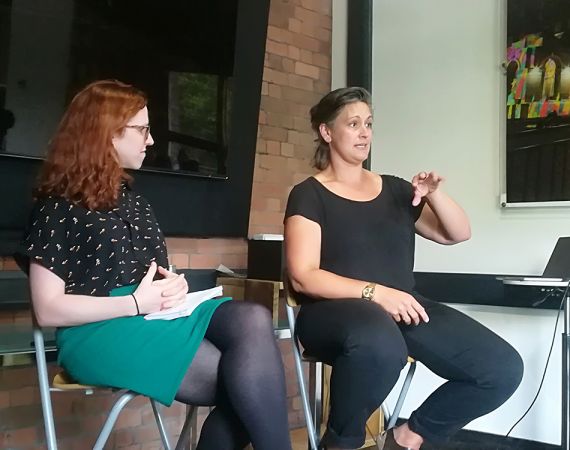Lunchtime talk write-up
Posted on Wed 25 Jul 2018
In Conversation with Emma Bettridge
Emma Bettridge is Bristol Old Vic Ferment Producer and for the last 8 years has been the driving force behind Ferment, an extraordinary testing ground supporting artists to develop and share experimental work at an early stage. We have known Emma for many years, and are endlessly inspired by her…

Posted by
Speakers
Emma Bettridge is Bristol Old Vic Ferment Producer and for the last 8 years has been the driving force behind Ferment, an extraordinary testing ground supporting artists to develop and share experimental work at an early stage. We have known Emma for many years, and are endlessly inspired by her ideas and approach to developing talent.
Five Things I Learned:
1. The Esmée Fairbairn Foundation is responsible for allowing the programme to run for nearly ten years. Emma provides various kinds of support that can be anywhere from having a chat and cup of tea with artists, working through their ideas, offering valuable rehearsal space, all the way to producing a small-scale show. The offer differs so much from artist to artist, some individuals need more support and others are happy to wander off and come back when they need to.
2. Emma has made every effort not to make Ferment an application-based process and encourages artists to get in touch with her directly. Quite often she meets new artists through recommendations. However, the one-to-one meetings aren’t always feasible due to time constraints so Emma is careful to manage expectations. Emma’s advice to new artists is to document everything, from scratch performances and readings, to any kind of research and development. The most important aspect is feeling like there is mutual trust between her and the artist.
3. Ferment do two group artists retreats each year in spring and autumn at Hawkwood College in Stroud, which allows them to bounce ideas off each other, play through and workshop things without any pressure. Unfortunately, artist development can be difficult to justify to funders and can be very outcome orientated, “it takes time to fuck it up, walk away and rebuild things”. Ferment Fortnight on the other hand, is an intensive research development process, showing various artists work in a fortnight once a year.
4. Emma has been careful not to call Ferment Fortnight a festival, as there’s already very established (and excellent) festivals like Mayfest and In Between Time and the artists are still at a very vulnerable stage with their work when sharing in a Fortnight. When you curate programmes, taste can affect the result. Utilising her six years of experience programming for Pleasance in Edinburgh, Emma aims to curate an eclectic mix not only for artists but for the audience as well.
5. Ben Atterbury will be taking over Emma’s role and this will be Emma’s last Ferment Fortnight, before leaving to pursue freelance projects across the region as well as continuing to work in strategy and consultancy capacity. Emma ended the talk by reflecting on the last 8 years and noting the effects of growing gentrification in Bristol and shrinking funding pots affecting local artists. She has noticed a lot of artists making work in Bristol, that aren’t showing work in the city. Her hope is to connect the dots across the region, “Bristol is great, but it is so hard to get funding here, and rehearsal spaces.”

